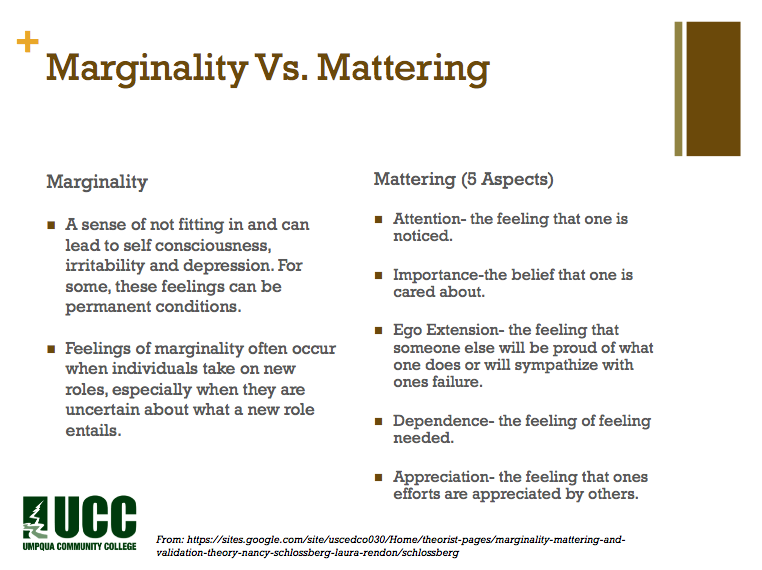This section discusses the work of Schlossberg & Rendón related to marginality, mattering, validation, and transitions for students. These theories can be particularly useful when supporting new students at an institution.
Nancy Schlossberg highlights a consideration that is vital to student affairs professionals and their work with diverse student groups– Mattering and Marginality. This considers the ways in which students might feel marginalized either constantly or in specific moments. This will affect the experience of students in college who may be uncertain of who they are, where they are going, how they want to make the most of their experience etc. Schlossberg notes that students feel marginalized most often when they taken on new roles. This is particularly important for students who have just started out at an institution and who are still learning what their role as a college student at their specific institution means for them and their identities.

One consideration when thinking of how we can help our students feel that they matter is by validating your students! Rendón discusses the importance of validation by encouraging students who may doubt their academic abilities, their likelihood of achieving their objectives, etc.
Curricular Validation
Degree-Planning: When students are interested in subjects or courses outside of their set or required degree plan, be sure to validate this interest and help them consider it further. By starting with encouragement to explore their interests and explaining the implications it has on their degree plan throughout or towards the end, you are giving your student the space to make an informed decision about their enrollment without dismissing an interest that could be extremely beneficial to them.
Academic Challenges: When a student is apprehensive about or experiencing an academic challenge in a course, it is important to validate their abilities and point to the resources that are their to support them in their education. Being aware of of the opportunities that exist for student support, such as course or subject group-tutoring/studying will allow you to meet the students where they are while encouraging them to grow. Validate the students’ decision to come to you for guidance if they chose to–this shows they are motivated to do better!– or validate the good work they have done in other coursework and be prepared to offer recommendations such as individual or group tutoring, writing centers, meetings with their professors etc.
Co-Curricular Validation
Support your students academic interests and objectives by encouraging their participation in curricular events or activities on campus. If possible, keep a listserv or even something as simple as an excel sheet with notes on students categories of interests they express to you either in a questionnaire or in an advising session related to their academic field or otherwise. With this tool, when a relevant guest lecture or film series or panel comes up, you can reach out to a particular student or a group of students to recommend the event and tell them “I thought of you because I know you’re interested in…” This will validate the students’ interests and passions and it will show them that you are listening to them and you understand how co-curricular activities can spark reflection on implications in their academic field.
Transition Theory (Schlossberg)
The 4 S’s
The four factors that affect one’s ability to cope with transition are: situation, self, support and strategies.
- Situation
- Trigger, Timing, Control, Role change, Duration, Previous experience with a similar transition, Concurrent stress, Assessment
- Self
- Two kinds: personal & demographic characteristics (SES, gender, age, health, ethnicity, culture etc.) and psychological resources (ego development, outlook, commitment, resilience, spirituality, self-efficacy, values etc.)
- Support
- Types (intimate, family, friends, institutional), functions (affects, affirmation, aid, honest feedback) & measurements (stable and changing supports)
- Strategies
- Three categories: Modify the situation, control the meaning of the problem, or aid in the managing of stress afterwards
- Four coping models: information seeking, direct action, inhibition of action, intrapsychic behavior
Patton, L. D., Renn, K. A., Guido, F. M., & Quaye, S. J. (2016). Student development in college: Theory, research, and practice. John Wiley & Sons.

